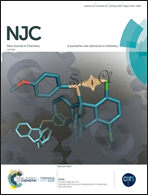Highly biocompatible jujube polysaccharide-stabilized palladium nanoparticles with excellent catalytic performance
Abstract
The development of stable and biocompatible palladium nanoparticles (Pd NPs) catalysts has been drawing great interest. In this study, Pd NPs were prepared through a green method, where jujube polysaccharide (JP) was employed as both reducing and stabilizing agents for the first time. The JP stabilized palladium nanoparticles (Pdn-JP NPs) displayed small size, high stability, good biocompatibility and excellent catalytic efficiency. Pd50-JP NPs showed high stability up to two weeks in solutions of a wide pH range (4–9). Pd50-JP NPs showed negligible cytotoxicity against HeLa cells at a high concentration of up to 400 μg mL−1. Furthermore, Pdn-JP NPs showed excellent catalytic activity for reduction of 4-nitrophenol (4-NP) in the presence of sodium borohydride (NaBH4). The normalized rate constant (knor) and turnover frequency (TOF) of Pd50-JP NPs were as high as 38.4 s−1 mM−1 and 4455 h−1, respectively. The prepared Pdn-JP NPs will have various potential applications in bio-related catalysis in the future.



 Please wait while we load your content...
Please wait while we load your content...